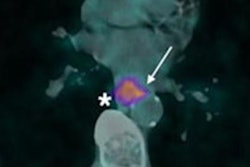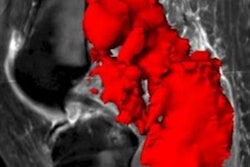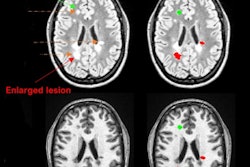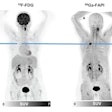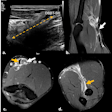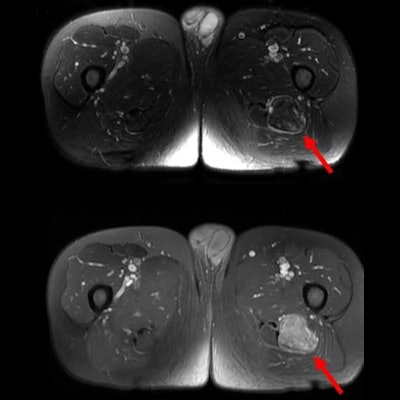
German clinicians have reported finding a rare tenosynovial giant cell tumor (TGCT) in a COVID-19 patient's thigh using gallium-68 (Ga-68) fibroblast activation protein inhibitor (FAPI) PET imaging, according to a case published on 26 January in the Journal of Nuclear Medicine.
The incidental detection highlights the high sensitivity of FAPI-PET for detecting previously unknown tumors, noted a team led by Dr. Timur Sellmann, head of anesthesiology and intensive medicine at the Evangelical Hospital Bethesda in Duisburg.
"Pathologic reassessment showed the definite diagnosis of a tenosynovial giant cell tumor, which is absolutely rare in this location," the group wrote.
TGCT is a rare type of soft tissue tumor that forms in the joints and although it is not typically cancerous, it can grow and damage surrounding structures, Sellmann and colleagues wrote. TGCTs are completely distinct from and should not be confused with any giant cell-rich tumors of the bone or soft tissue, they noted.
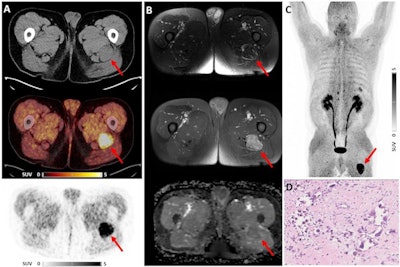 Ga-68 FAPI-PET/CT imaging in a 55-year-old male patient. No increased pulmonary tracer uptake was found (A, C). Tracer uptake colocalized with a sharply circumscribed, inhomogeneously contrast-enhancing mass on MRI without relevant diffusion restriction (B). Pathologic assessment diagnosed a tenosynovial giant cell tumor (D). Image courtesy of the Journal of Nuclear Medicine.
Ga-68 FAPI-PET/CT imaging in a 55-year-old male patient. No increased pulmonary tracer uptake was found (A, C). Tracer uptake colocalized with a sharply circumscribed, inhomogeneously contrast-enhancing mass on MRI without relevant diffusion restriction (B). Pathologic assessment diagnosed a tenosynovial giant cell tumor (D). Image courtesy of the Journal of Nuclear Medicine.Fibroblast activation protein (FAP) is overexpressed by cancer cells, and researchers suspect it is an essential component driving the growth of tumors. Experimental FAP-targeted molecular imaging radiotracers, such as FAPI-04 and FAPI-46, have shown promise in cancer research as well as for visualizing myocardial fibrosis.
Sellmann's team reported the rare tumor finding in a 55-year-old patient who underwent imaging due to persistent pulmonary symptoms after recovery from COVID-19. The patient was enrolled in a first-in-human trial testing Ga-68 FAPI-04 PET/CT scans (Biograph mCT, Siemens Healthineers) for identifying disease progression in 21 patients with interstitial lung disease.
The trial showed no increase in pulmonary radiotracer, but the researchers observed focally increased Ga-68 FAPI uptake in a mass in the patient's left thigh. Surgeons performed complete resection of the tumor.
"This report demonstrates the high sensitivity of Ga-68 FAPI-PET/CT to detect previously unknown tumors, making it a promising test in cases of suspected tumor disease or in cancers of unknown primary," the group concluded.




